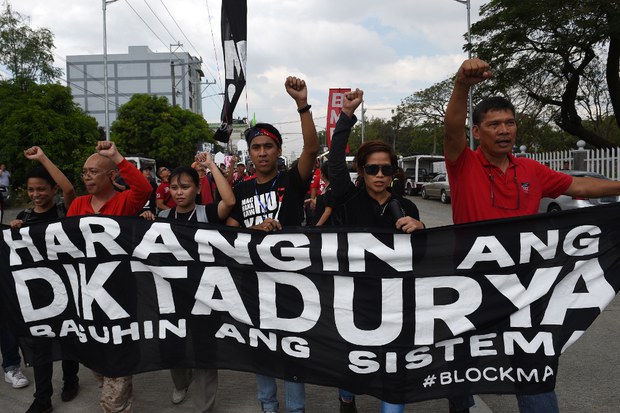Philippine Rights Advocates to Challenge Court Ruling in Marcos Suit
2017.07.17
Manila
 Protesters carry a banner that reads “block the dictatorship” during a demonstration in front of the heroes’ cemetery in Manila to coincide with the anniversary of the civilian-backed military uprising that toppled President Ferdinand Marcos, Feb. 25, 2017.
Protesters carry a banner that reads “block the dictatorship” during a demonstration in front of the heroes’ cemetery in Manila to coincide with the anniversary of the civilian-backed military uprising that toppled President Ferdinand Marcos, Feb. 25, 2017.
Rights advocates said Monday they would contest a Philippine court’s rejection of a bid by thousands of victims of Ferdinand Marcos’ authoritarian rule to collect about $2 billion in damages awarded by an American court.
The Philippine Court of Appeals has dismissed a petition filed by the victims who sought enforcement of a February 1995 ruling by a U.S. federal court, which had awarded $1.9 billion to about 10,000 plaintiffs in a class-action lawsuit.
Loretta Ann Rosales, the former chairwoman of the Commission on Human Rights who filed the petition on behalf of the victims, vowed to appeal.
“It seemed an absurd decision because that action by the Hawaii court has long been used in world jurisprudence. It has been historically recognized,” Rosales told BenarNews.
But the Hawaii district court’s ruling was not binding because it did not have jurisdiction over the case, according to Associate Justice Normadie Pizarro.
“Rules of comity should not be made to prevail over our Constitution and we cannot allow foreign impositions to trample upon our sovereignty,” Pizarro said, adding that the U.S. court’s decision also failed to meet standards of valid judgment in the case.
The court also said the case could not be considered a class suit because the claimants were classified into three categories – as victims of torture, summary execution or disappearance.
It said the Hawaii court also failed to ensure that the 10 Filipino citizens who initiated the case truly and legally represented the other purported claimants.
Ramon Casiple, who represents another group of victims, said the Marcos family has been aggressively fighting the courts since they returned home after the death of the dictator in 1989 in Hawaii, where the Philippine leader fled in 1986 at the height of a popular revolt that toppled his 20-year rule.
The Marcos family “basically invoked technical issues and undertook delaying tactics,” Casiple said.
Ferdinand Marcos ruled the Philippines for two decades, mostly under martial law. Thousands were killed or went missing during his dictatorship.
But his arch political foe, Sen. Benigno Aquino Jr., was assassinated in 1983 shortly upon landing at Manila airport from U.S. exile, galvanizing the fragmented political opposition against Marcos that culminated into a “people power” uprising, eventually toppling his regime three years later.
Members of the Marcos family were subsequently allowed to return home, where they have regained political clout. Widow Imelda is a congresswoman and daughter Imee was elected governor of the family’s northern bailiwick. Son and namesake Ferdinand Marcos Jr. became a senator, who narrowly lost the presidency last year.
They have also found a strong political benefactor in President Rodrigo Duterte, who has publicly said he idolized Marcos and claimed that Imee Marcos contributed to his campaign funds.
Last year, Duterte made true on his campaign promise to allow Marcos’ remains to be granted a state funeral at Manila’s national heroes’ cemetery, triggering a public outcry.







